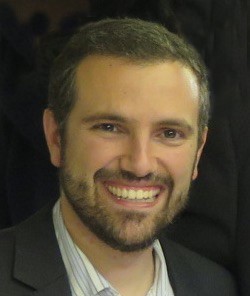Speakers
Researchers with multidisciplinary backgrounds will talk about their research and experience in the symposium. Click the name tag to find more about our key-note speakers.

My prime research interest is understanding how global warming affects the number and intensity of extreme weather events like heat waves, heavy rainfall and persistent droughts. I use a variety of methods, including advanced statistical analyses, climate models and novel machine learning techniques, to gain new insights. Working with high-level stakeholders (e.g. the World Bank) ensures that my research focusses on the most relevant extremes, i.e. those with the highest risks for society. I have authored over 60 peer-reviewed publications, with several in top-ranking journals, the IPCC 5th Assessment Report, 3 World Bank reports and several book chapters.
Peter has joined ECMWF in October 2016. He is the Coordinator of machine learning and AI activities at the European Centre for Medium-Range Weather Forecasts (ECMWF) and holds a University Research Fellowship of the Royal Society that allows him to follow his research interests in the area of numerical weather and climate modelling, machine learning, and high-performance computing. Before moving to ECMWF, he wrote his PhD thesis at the Max-Planck Institute for Meteorology in Hamburg, Germany, on the development of a finite element dynamical core for Earth System models. During the subsequent Postdoctoral Position with Professor Tim Palmer at the University of Oxford, he was focusing on the study of reduced numerical precision to speed-up simulations of Earth System models. During this time, he has written one of the first papers to test the use of Field Programmable Gate Arrays (FPGAs) in atmospheric applications, published the first paper on an approach to secure atmosphere models against hardware faults, and developed the first version of the weather forecast model IFS of ECMWF that was able to run in single precision instead of the double precision default. This change in precision is generating a reduction of runtime of forecast simulations by 40% and is currently prepared for operational weather forecasts at ECMWF. He is a work-package leader of the ESiWACE 2 Centre of Excellence, a co-author of the ESCAPE 2 project and Co-Pi on an INCITE grant that provides access to the fastest supercomputer in the world, Summit.

Qingyi Feng is a passionate-for-life-and-dedicated-to-work complex systems scientist currently coordinating and does research at the Centre for Complex System Studies (CCSS) which harbors talented researchers from a wide range of disciplines seeking novel solutions for societal challenges.

Maurice Schmeits has a MSc degree in Meteorology and Physical oceanography and a PhD degree in Physical oceanography, both obtained from Utrecht University. After a short time as a postdoc, also at Utrecht University (IMAU) he started working at KNMI. Since then his main research interest has been statistical post-processing of NWP output and probabilistic forecasting of (extreme) weather. Besides, he is leading the data science cluster in the R&D climate and weather modeling department. He collaborates with a number of universities and other meteorological institutes.

Devis Tuia received a Ph.D. in Environmental Sciences at University of Lausanne in 2009. He was then a postdoc researcher at the University of València, Spain, the University of Colorado, Boulder, CO, USA and EPFL Lausanne. In 2014-2017, he was an Assistant Professor at the University of Zurich and professor at Wageningen University. He is now full professor at Swiss Federal Institute of Technology Lausanne, Switzerlands. His research focuses on geospatial computer vision, a field at the interface between GIscience, remote sensing and machine learning. He develops digital solutions to address problems of land planning and the environment. He led most of his efforts in urban recognition, land-use modeling and analysis, but he also have experience in wildlife tracking, environmental risk reduction and forest management through scientific collaborations.

dr. Wim Wiegerinck studied theoretical physics at the University of Amsterdam. He did his PhD in the neural network group of the Biophysics department at the Radboud University Nijmegen (RU). After his PhD he became researcher at SNN (Foundation for Neural Networks). Since 2006 he is vice-director and senior researcher of the company SMART Research BV. In addition, he is guest lecturer at the RU, teaching Machine Learning courses. His main interest is in theory and applications of probabilistic modeling and inference, Bayesian networks, machine learning, neural networks and deep learning